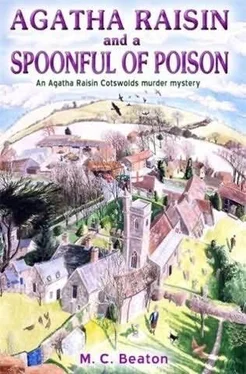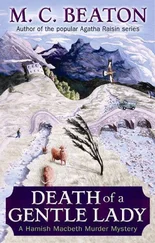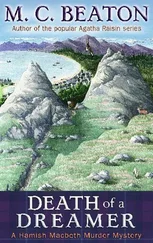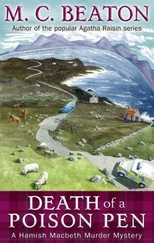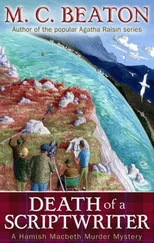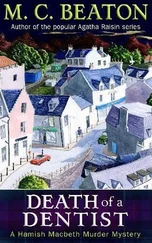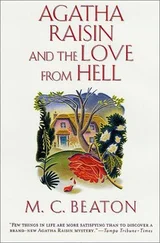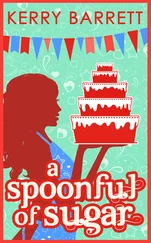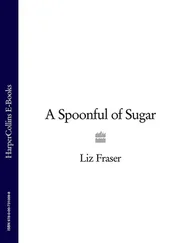“Then why don’t you ask him? Really! I have a lot to do and I cannot see the point of all these questions.”
Charles thanked her and, taking a reluctant Agatha by the arm, propelled her outside. “It’s no use,” he said. “You’re not going to get anywhere. You can’t come right out and ask her if Sybilla murdered George’s wife. She won’t have a clue anyway.”
“Let’s go and see Maggie Tubby and Phyllis Tolling. They’re the ones who put the idea in my head.”
The rain was still pouring down and they stood under an umbrella on the porch of the cottage in the main street, which seemed to be rapidly turning into a river behind them.
Phyllis opened the door. “You again. I thought the case was closed.”
“Not quite,” said Agatha.
“Come in.”
Maggie was reading a book in the front parlour. “Who’s your friend?” she asked.
“This is Sir Charles Fraith, who is helping me in the investigation.”
“A ‘sir,’” mocked Maggie. “How too terribly Dorothy Sayers. What do you want now?”
“Why did you suggest that Sybilla killed Sarah Selby?”
“We’re sure she did. She was so unbalanced when it came to George. Now it looks as if she went even battier and tried to poison the village.”
“But in her suicide note, she said she was sorry about a death. A death. Not two.”
“You don’t think she would be in exactly a sane state of mind,” said Phyllis. “What’s the matter with you? Trying to drum up some business? I tell you, the sooner that accountant gets to the bank and you give him that safe deposit key and he starts sending some money to the Andrews and Jessop families, the better it will be.”
“How do you know about the safe deposit key?” demanded Agatha.
“It’s all over the village. Everyone’s been trying to get their hands on some of the money. Some claim that the visitors trampled over their gardens and ruined them-that sort of thing.”
“So the only reason you think Sybilla killed Sarah Selby was a hunch?”
“Of course it was a hunch, you thickheaded creature. If we’d had any proof, we’d have gone to the police.”
“Come along,” said Charles. “The two witches haven’t got anything important to say.”
Maggie’s eyes gleamed with mischief. “You don’t like us, do you?”
“Who would?” said Charles.
____________________
Two days later, as the monsoon-like rain still continued to pour down, Agatha phoned her office. “I’ll be a bit late,” she said to Mrs. Freedman. “I’m going into Evesham to get my hair done.”
“You can’t, in this rain. Evesham’ll be drowned.”
“That’s down in the town. My hairdresser is in Bridge Street and it never gets flooded. I’ll go in by the ring road.”
“You’d better watch your village doesn’t flood.”
“Carsely never floods.”
“It might this time.”
Agatha noticed as she drove over the Simon de Montfort Bridge on the ring road that the river Avon had already flooded and was spreading rapidly out over the farmland on either side.
Although the traffic was moving easily on her side of the road, the other side seemed to be grid-locked.
She parked in the Aldi supermarket car park and walked through to Bridge Street. Outside Achille, the hairdresser’s, she turned and looked down towards the bridge. Police barriers were up. She walked down and joined the crowed of sightseers on the bridge. Waterside on the other side of the bridge was flooded. A large mobile home came hurtling down the river and smashed into the bridge. Bits of it appeared on the other side as if it had been through a giant shredder.
Agatha debated whether to return home while there was still time, but without her hair done she felt insecure.
Jeanelle, her hairdresser, greeted her with surprise. “We’ve been phoning up clients telling them not to come,” she said.
Agatha’s mobile rang. It was Toni. “We’re evacuating the office,” she said. “The police have been round telling us the water’s rising. The street below is flooded. We’re on the first floor, so with luck the water won’t come this high. But Phil’s found a man with a tractor and we’ve all been loading up the files and computers. The car park’s still dry, so once the tractor gets the stuff there, we can load it into our cars and take it to a storage unit we’ve rented on high ground.”
“It’s really bad, isn’t it?” said Agatha.
“Nobody’s seen anything like it.”
“Phone you later,” said Agatha.
But she insisted on getting her hair done.
As she joined the queue inching out of Evesham, she wished she had never come. She had complained about the rap music playing in the hairdressing salon. It had crashed around her ears sounding like “Ugh, hunna hunna mudda fudda bitch, ugh.”
“Who likes that awful music?” she had asked Jeanelle. “Young people,” said the hairdresser. “It’s our music, if you know what I mean.”
I feel on the outside looking in, mourned Agatha. I feel trapped in an age group that’s out of touch with every other age group.
It took her three hours to reach the Carsely turn-off on the A44 by managing to plough through areas of flooding on the road.
When she got down to just before the centre of the village, she was met by a flood. Groaning, she parked the car, took off her shoes and began to wade through the swirling water. A dead cat floated past and a spasm of fear clutched her as she thought of her own cats.
The rain was still falling in torrents. She slipped and stumbled, several times nearly falling, until at last she reached dry ground on the other side. Agatha put on her shoes and hurried to Lilac Lane. Water was swirling down the lane. She rushed to her cottage. Charles had barricaded the front door with sandbags.
Agatha let herself in. He had left her a note on the kitchen table.
“Gone to check my own place. Keep dry! Love, Charles.”
Agatha checked her cats were safely indoors before going upstairs to change into dry clothes.
“It can’t get any worse,” she muttered.
But it did. Gloucestershire and the counties round about went under water. Her cottage stayed dry, but she had to house three elderly couples from the village who complained constantly that all the food she seemed to have were microwave curries.
Just when Agatha felt like committing murder herself, the sun came out and the waters receded. With great relief she saw her unwanted house guests leave. But then she was drafted in by Mrs. Bloxby to help clean out flooded cottages and to make frequent trips to the supermarket in Stow to bring back supplies of bread and milk.
At last she was free to go to her office in Mircester. Her staff were all there, unloading computers and other office equipment.
Gradually everything got back to normal and Agatha was just considering one evening whether to pursue the Comfrey Magna poisoning when she received a visit from Bill Wong.
“Survived the floods, Bill?”
“Just about. Agatha, this isn’t a social call.”
“What’s happened?”
“Someone masquerading as Arnold Birntweather, the accountant, and with all his identification called at the bank with the safe deposit key. He said the money needed to be counted again. He put it all in a large holdall and disappeared. In appearance, he seemed to be like the accountant, elderly and stooped.”
“But did the police hand this impostor the key?”
“They seem to have handed it over to the genuine man just after the flooding was over. He was accompanied by the vicar. When the vicar did not hear from him, he called at his house. Mr. Birntwweather had been killed by a savage blow to the head.”
“But they had seen Mr. Birntweather at the bank before.”
Читать дальше
